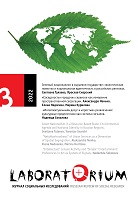Зеленый национализм в сырьевом государстве: экологическая повестка и национальная идентичность в российских регионах
Green Nationalism in a Resource-Based State: Environmental Agenda and National Identity in Russian Regions
Author(s): Svetlana Tulaeva, Yaroslavc SnarskiSubject(s): Energy and Environmental Studies, Regional Geography, Nationalism Studies, Identity of Collectives
Published by: Центр независимых социологических исследований (ЦНСИ)
Keywords: Green Nationalism; Resource Nationalism; Environmental Conflicts and Protests; Resource-Based State;
Summary/Abstract: The growth of global environmental problems and the strengthening of environmental rhetoric in the world have led to the awareness of the environmental issues among ordinary citizens. In many societies, the growing interest in environmental issues coincided with the reincarnation of nationally charged discourses. This led to the emergence of such a political hybrid as green nationalism. Green nationalism is understood as a movement focused on environmental demands related to the advancement of national or subnational interests, as well as the protection of minority interests. It is based on rhetoric that addresses national attributes such as territorial identity and cultural cohesion, as well as environmental issues. Its development can take place according to different scenarios: “from the top down” due to the efforts of political elites to form civic nationalism based on ideas about the nation’s contribution to solving global environmental problems, or “from the bottom up” through the actualization and protection of the interests of the minority. However, the study of the phenomenon of green nationalism entails the need to comprehend several important paradoxes. The first paradox is based on the clash of global and local interests. On the one hand, environmentalism is a global movement focused on solving such global environmental problems as climate change, pollution of seas and oceans, and deforestation. On the other hand, environmental issues create opportunities for strengthening national or local identity. The second paradox is determined by the influence of the political regime on the importance of environmental concerns for societies. Traditionally, it is believed that environmental values are successfully formed and maintained in societies with a democratic regime. However, environmental issues are also discussed under hybrid or authoritarian political regimes. In the situation where open political protest is impossible, subnational movements for political autonomy and national independence can take the form of environmental protests. The third paradox is associated with the peculiarities of the perception of natural resources in states that are dependent on their extraction. On the one hand, natural resources are the basis of economic well-being in such societies, which legitimizes the consumer logic of dealing with nature. On the other hand, in such states, the importance of nature as a national treasure is emphasized, which contributes to the development of environmental activities. Our article provides answers to the following research questions: How does the global environmental agenda lead to an intensification of nationalist discourses? Why does green nationalism emerge and successfully develop in a resource-based state? Why is environmentalism, usually oriented toward democratic values, in demand in authoritarian states? These issues will be considered in the article on the examples of environmental conflicts and protests in Russian regions, which are closely related to the maintenance of national or subnational identity. The main cases for the analysis were protests against the development of the Shikhan Kushtau in Bashkiria (2020) and conflicts of the Indigenous peoples of the North with the oil company in the Khanty-Mansi Autonomous Okrug (2017). The research was carried out on the basis of qualitative methodology. The main research methods were semistructured interviews with protesters. The results of the study show that environmental issues are becoming a serious tool for mobilizing society as they entwine with issues of national/subnational identity, as well as ideas about social justice.
Journal: Laboratorium. Журнал социальных исследований
- Issue Year: 14/2022
- Issue No: 3
- Page Range: 4-33
- Page Count: 30
- Language: Russian

